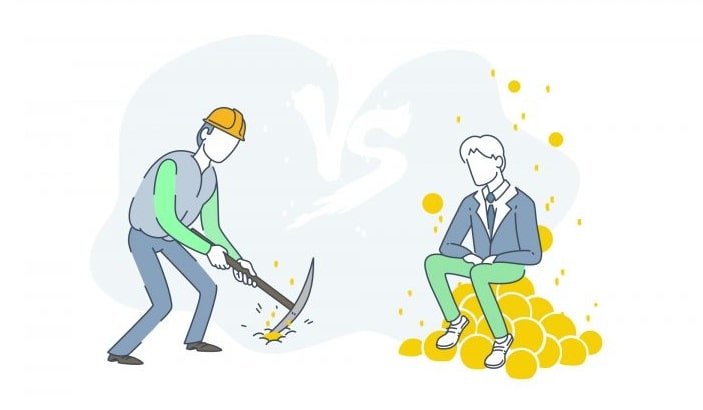Proof of stake vs Proof of work

So, this is another one of those trending topics of this much trending crypto space, today we are here to discuss in simple language what is “Proof of work” and “Proof of stake”?
If you are following the cryptocurrency space closely then you must be aware of the technology behind the cryptocurrencies and the basic terminologies related to this space like bitcoin, blockchain, blocks, smart contracts etcetera if you are not then I would suggest you go on and read the other basic articles available on our website explaining all the basic terminologies that we will be using here.
So, let us start with bitcoin, it has been brought to the notice of the masses that the bitcoins mining process requires a huge amount of electricity all thanks to Elon Musk. While it is not very far from reality if we try to put this into perspective then the electricity used by the sole mining of bitcoin all over the world can power a small country like Newzealand and the carbon footprint is also positive, why?
Because right now bitcoin is using the “Proof of work” concept to validate transactions on the underlying blockchain.
So, what is this “Proof of work”?
Well, Proof of work is the process in which millions of computers and supercomputers are competing to get the chance of writing or validate the next block in a blockchain.
Why does it require so much power?
To win the competition the person or company with the most processing power will have a much higher chance to win, it is like a guessing game, people with huge power-hungry systems are fighting to guess the answer of a cryptographic question (the transaction) and whoever has the highest processing power can provide more number of guesses in a short period increasing there chance of winning.
Why are people doing this?
To earn the transaction fees, in this proof of work process whoever guesses the answer right he gets rewarded with a certain number of bitcoins.
What is proof of stake?
Proof of stake is the process in which a stake of cryptocurrency is collected from you and then you are listed as a validator in a lucky draw system to pick the next validator to solve the cryptographic problem and here there is no competition.
Why is it better?
Because there is no contest of computers or supercomputers always turned on fighting for the chance to guess the answer of the problem right. Which in turn is very less power-hungry and good for the environment too.
Because there is no contest and the validator is chosen at random and who has the largest stake to guess the correct answer. He or she will get to write the next block in the blockchain.
Reward
The reward remains the same, he or she when validates a transaction gets the same transaction fees, and is rewarded with the cryptocurrency.
I hope the difference and concept are clear among you guys about why the whole world is moving towards the proof of stake mechanism instead of the proof of work mechanism?
Because it is better for the environment and cannot be easily turned into a monopoly like the proof of work system as the person or company with the better resources gets to solve the question every time while in proof of stake system it is decided on random that who gets to solve the problem and gets to forge the next block. The only disadvantage is that it is very easy to be a miner and there is a whole waiting list waiting to be validators for proof of stake supported coins.
Bitcoin and Ethereum are the classic examples of cryptocurrencies that work on the proof of work mechanism.
Ethereum 2.0 and Cardano are examples of cryptocurrencies that work on the proof of stake mechanism.
This is an overly simplified explanation of the Proof of work and proof of stake systems and can be further researched if you want better insight on the topic.



